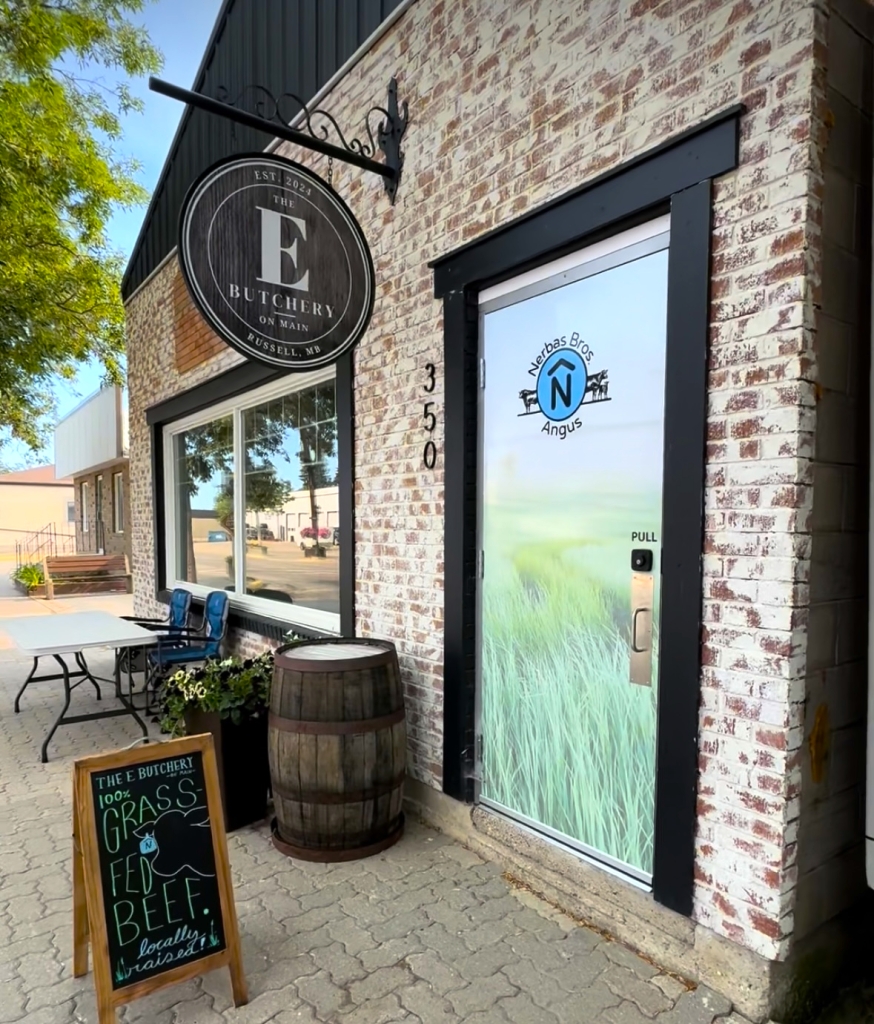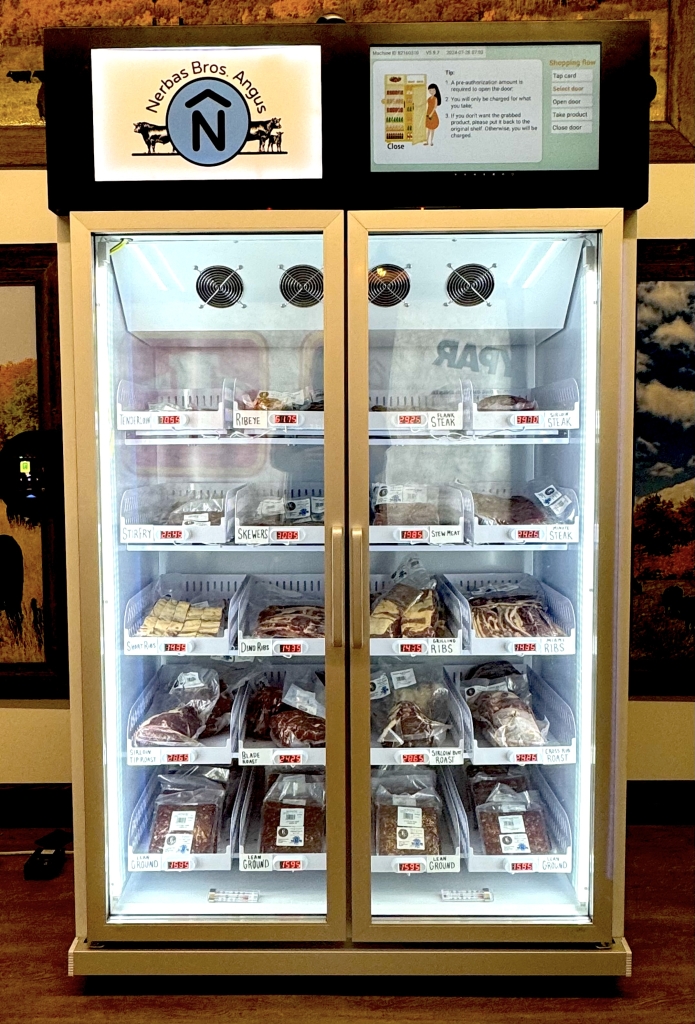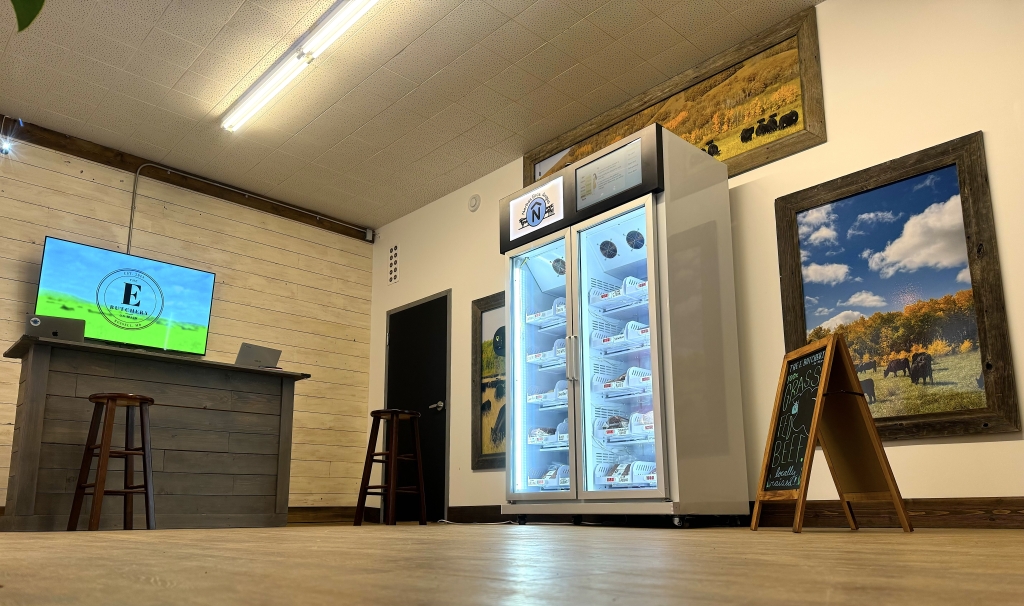
Russell, MB.
NOTE: While a beef story it is really a meat story because could easily be exchanged to pork.
The E Butchery on Main in Russell, Manitoba, is North America’s first meat vending machine business, created by Nerbas Bros. Angus. It allows consumers to purchase fresh, locally sourced meat in portions they choose at any time.
Inspired by European models, this innovation merges traditional farming with modern technology, addressing challenges like payment processing and product weight management. The community response has been positive, and people see the model as a way to support local agriculture and provide convenient access to meat.
Arron Nerbas, a partner in both businesses, the E Butchery on Main and the farm / Nerbas Bros. Angus and third-generation farmer explained their shift in strategy. “We’ve been selling direct-to-consumer products in some form for about five years, some on our own and some with partners to supply the Winnipeg market.”
Initially, they hesitated to sell locally due to price concerns, as rural customers often prefer to avoid paying city prices. “We didn’t want to sell at farmers markets or in bulk at meeting points.”
They were always exploring alternative methods to reach consumers effectively. There must be another way.
In January 2023, Arron travelled to England to speak at a breeders conference. While he didn’t encounter vending machines there, he made valuable connections and observed trends on Twitter and Facebook. He noticed farm shops in England incorporating self-service vending machines. Arron connected with a vendor in England who sells and services these machines through his network, purchasing a model from China that was shipped directly for use in his operations.

Arron described the unit as a weigh freezer, a smart freezer that sells by weight. It has 20 trays, each programmed for specific products with a price per kilogram. When a product, like a blade roast, is removed, the machine calculates the exact weight and charges accordingly.
“We thought a system like this might work because, in small communities, people often can’t buy for convenience—they have to purchase in bulk, which requires a lot of money and freezer space.”
The smart freezer lets customers buy directly from a local farmer, even just one steak or a package of ground beef at a time. “It’s a neat alternative that no one has done before in North America.”
The pricing is slightly above a newly established Co-op store’s regular prices.
“We could market our product to people in Winnipeg who might pay more, but on a local scale, it’s not possible.”
The goal was to keep it fair and accessible to the local community.
The system charges the customer based on the programmed price per kilogram. When closing the door, it locks, completes the transaction, and charges the debit or credit card. This setup is effective because, in small communities, people typically can’t buy meat in convenient portions—they often have to buy large quantities like a quarter, half, or whole animal, which requires a significant amount of money and ample freezer space.
“This system offers a solution by allowing customers to purchase smaller, more convenient portions directly from local farmers.”

Nerbas took a chance and bought a building and remodelled it into a retail space, inventory room, and extra storage. The small retail area in front is about 14 by 20 feet. He explained that they sell frozen meat products to avoid the logistics and shelf-life issues associated with fresh products, emphasizing that frozen meat is as good as fresh.
Nerbas said that, with approval from Manitoba Health, their store operates under a hawker’s permit, which requires adhering to specific standards. All the meat sold in their store comes directly from their farm, processed by Cut-Rite Meats in Neepawa, MB, just down the road. Here, they process the meat, package it, freeze it, and deliver it back to their store for sale, ensuring transparency and quality for their customers.
Nerbas said that the response to their new vending system is positive, driven by its novelty and the curiosity it generates. While it might not appeal to everyone, Nerbas believes it will attract loyal customers who appreciate its offer.
Regarding the variety of cuts available, Nerbas emphasizes a “nose to tail” philosophy, aiming to use all parts of the animal efficiently. He highlights a major issue in the current food system: nutrient-dense organs are often undervalued and discarded. Nerbas is committed to creatively using every part of the animal, not just focusing on high-quality steaks or ground beef.
The business model revolves around an automated, self-serve system where customers can access the building using a membership PIN code, allowing them to shop at their convenience. While there will be designated pick-up or open days for those who prefer in-person interaction, the primary focus is on the self-serve, automated experience. •
— By Harry Siemens





